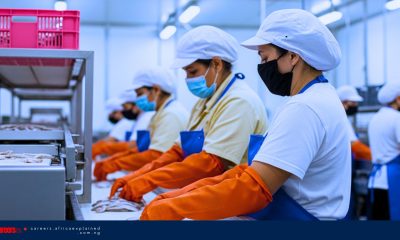Canada Sponsorship
Jobs Openings At PepsiCo – 291 Elliott Ave, Kingston, ON

Job Title: PepsiCo Beverages Seasonal Part Time Warehouse Worker
Location: 291 Elliott Ave, Kingston, ON
Shift: Morning, Night, Overnight
Wage: $22.60/Hour
PepsiCo Beverages Canada is recognized as one of Canada’s Top Employers for Young People (2023). PepsiCo’s mission is to create smiles with every sip and every bite. We are committed to bringing our beloved consumer brands to market while doing good for the planet and our communities. Our success lies in our people. We offer our employees opportunities to make a meaningful impact, gain new skills and build successful careers in a diverse and inclusive workplace. Bring your unique perspective. Bring curiosity. Bring ingenuity. Bring drive. Because what makes you unique, makes us better.
This is a great role for students in all kinds of programs. In this role you will help us get our famous brands to the people who love them all across Canada. You’re ambitious and hard-working and see every challenge as an opportunity. You pride yourself on being motivated, strong and a team player, and you have strong organizational skills. You want a job that will maximize your summer earning potential as well as open doors for the future and prefer to be out in the world rolling up your sleeves than behind a desk all day.
Please review our realistic job preview it will be referenced throughout the interview process
Compensation:
- $18.21 per hour with part time hours
- Eligible for Seasonal Contract Completion Bonus
What you can expect from us:
- Future opportunities. We are one of Canada’s top 10 employers of youth
- A working environment that puts health and safety first
- Great people and culture – proudly bring your whole self to work!
Responsibilities:
Schedule: Ideal Candidates are flexible to work different shifts.
- Days: Location to enter
- Afternoons: Location to enter
- Nights: Location to enter
- Preparing clients’ orders using an automated Voice Pick system
- Building stable, secure, and accurate pallets
- Moving products that can weigh up to 60lbs
- Loading/unloading trucks
- Performing all tasks safely and efficiently
- Completing reports
- Following team leader’s instructions with precision.
Physical demands and working conditions:
- You can lift/carry 60 lbs. repetitively for up to 8 – 10 hours a day
- You are comfortable working in a multi-temperature environment
Qualifications:
- You have a High School Diploma and currently enrolled in a Professional studies Diploma/ Degree program
- You are a team player
- You’re physically fit
- You have basic writing and mathematics skills that allow you to complete required paperwork accurately
Additional skills you may have (not required, these are assets)
- Walkie rider or forklift experience
- Previous warehouse experience
What skills and qualities are important for a Warehouse Worker?
Being a successful Factory Worker requires a combination of technical skills, physical abilities, and personal qualities. Here are some important skills and qualities for a Factory Worker:
- Technical Skills: Factory Workers should possess specific technical skills relevant to the type of factory they work in. This can include operating machinery, understanding assembly processes, following manufacturing instructions, and utilizing tools or equipment. Familiarity with industry-specific processes and equipment is crucial for efficient and safe production.
- Physical Stamina and Strength: Factory work often involves physical labor, requiring endurance, strength, and the ability to stand for extended periods. Factory Workers may need to lift heavy objects, perform repetitive tasks, and work in physically demanding conditions. Good physical stamina and fitness are essential.
- Attention to Detail: Factory Workers must pay attention to detail to ensure accuracy and quality in their work. This includes following instructions precisely, inspecting finished products for defects, and adhering to quality control standards. Attention to detail helps prevent errors, reduce waste, and maintain production efficiency.
- Hand-Eye Coordination: Many factory tasks require excellent hand-eye coordination to perform precise movements, handle small parts, or operate machinery accurately. Hand-eye coordination helps with tasks such as assembly, packaging, or operating control panels.
- Technical and Mechanical Aptitude: Having a natural aptitude for understanding technical or mechanical concepts is valuable for Factory Workers. This includes being able to troubleshoot basic equipment issues, make minor adjustments, or understand machinery operations.
While formal education may not always be required for entry-level Factory Worker positions, specific certifications or training programs may be beneficial depending on the industry or type of factory. Additionally, demonstrating a positive attitude, a willingness to learn, and a strong work ethic are valuable qualities for success as a Factory Worker.
What education and certification are required to become a Warehouse Worker?
The education and certification requirements for becoming a Factory Worker can vary depending on the industry, the specific type of factory, and the employer’s preferences. In many cases, formal education beyond a high school diploma or its equivalent may not be required. However, certain certifications or training programs can enhance job prospects and provide valuable skills. Here are some relevant options:
- High School Diploma or Equivalent: A high school diploma or its equivalent is typically the minimum educational requirement for entry-level Factory Worker positions. It demonstrates basic educational attainment and foundational skills.
- On-the-Job Training: Many employers provide on-the-job training for Factory Workers. This training covers specific tasks, procedures, and safety protocols related to the production processes in the factory. On-the-job training enables individuals to gain practical skills and knowledge directly in the factory environment.
- Industry-Specific Training Programs: Some industries offer specialized training programs or apprenticeships for Factory Workers. These programs focus on developing the necessary skills and knowledge for the specific industry or manufacturing processes. They may cover topics such as machine operation, assembly techniques, quality control, and workplace safety.
- Technical or Vocational Education: While not always required, completing technical or vocational education programs in fields related to manufacturing or industrial operations can provide a solid foundation of knowledge and skills. These programs may include coursework in areas such as machine operation, industrial technology, manufacturing processes, or quality assurance.
- Forklift Operator Certification: If the factory involves the use of forklifts or other material handling equipment, obtaining a forklift operator certification may be beneficial. This certification demonstrates competence in operating forklifts safely and adhering to applicable regulations.
It’s important to note that the specific requirements can vary significantly depending on the industry and the employer’s preferences. Some factories may have specific training programs or certifications tailored to their operations. Additionally, certain industries may have regulations or safety standards that require employees to complete specific training or hold relevant certifications.
To determine the specific education and certification requirements in your desired industry or factory, it is advisable to research job postings, consult with potential employers, or reach out to industry associations or trade organizations associated with manufacturing or the specific industry of interest.
While formal education and certifications can enhance job prospects and provide a foundation of knowledge, demonstrating a strong work ethic, a willingness to learn, and the ability to follow safety protocols are important qualities that employers often value in Factory Workers.
Who can apply to this job?
The employer accepts applications from:
- Canadian citizens and permanent or temporary residents of Canada.
- Other candidates with or without a valid Canadian work permit.
How to apply
Online: Apply On Company WebSite
What is the work environment like for Warehouse Worker?
The work environment for a Factory Worker can vary depending on the type of factory and the specific tasks involved. Here are some general aspects of the work environment that Factory Workers may experience:
- Industrial Setting: Factory Workers typically work in large industrial facilities or production plants. The environment may include machinery, equipment, assembly lines, or specialized workstations specific to the factory’s operations.
- Shift Work: Factories often operate on multiple shifts to maximize production capacity. Factory Workers may work day shifts, evening shifts, night shifts, or rotating shifts, depending on the factory’s schedule. This can provide flexibility but may also require adjusting to different work hours.
- Noise and Machinery: Factories can be noisy environments due to the operation of machinery, equipment, or production processes. Factory Workers should be comfortable working in such conditions and follow safety procedures when working near or around machinery.
- Safety Precautions: Safety is a top priority in factory environments. Factory Workers must adhere to safety protocols, wear appropriate personal protective equipment (PPE), and follow safety guidelines to protect themselves and others. This includes being aware of potential hazards, such as moving machinery, electrical equipment, or chemical substances.
- Teamwork and Collaboration: Factory work often involves working as part of a team. Factory Workers may collaborate with colleagues, supervisors, or other staff members to achieve production goals. Effective communication, cooperation, and the ability to work well with others are important in a team-based environment.
It’s important to note that the specific work environment for a Factory Worker can vary based on the industry, the type of factory, and the specific production processes. Each factory may have its own unique dynamics, safety protocols, and requirements.
🔥Latest Job Vacancies in Canada (Updated Daily)
🇨🇦 Jobs in Canada with Sponsorship – Home Support Worker
Apply Now🇨🇦 Farm Worker Jobs with Sponsorship – Manitoba
Apply Now🇨🇦 Visa Sponsorship Jobs in Canada – Caregiver
Apply Now











